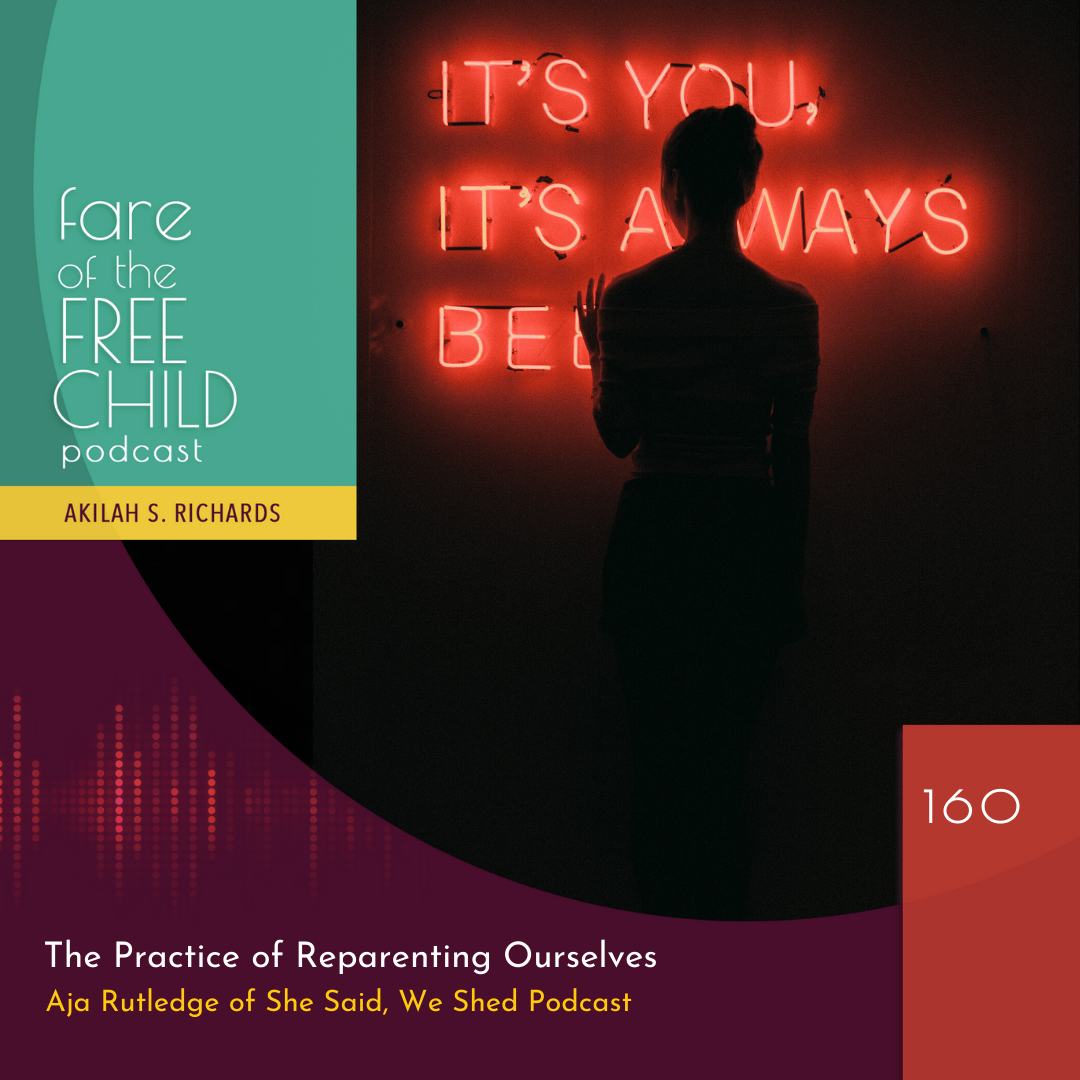Aja Rutledge: A single mother who moved abroad to Mexico with her son to design their liberation, moved back to the U.S. and ended up staying with her mother longer than anticipated. Aja has been realizing how much her mother’s baggage affected her own sense of worth and value.
What Was Discussed:
We’re excited about Aja, whom you’ve heard on previous podcasts and one of the things she’s now doing is her own out-loud deschooling. This is work that is near and dear to us and is healing work, like all deschooling is.
It’s moving outside of all of the different ways that we have been steeped in and informed by trauma. Much of the work we talk about here on Fare of The Free Child is to try not to perpetuate it, to try to recognize the ways that it has us so that we don’t weaponize it.
Aja’s healing work is specifically related to her relationship with her mother and that’s what’s being discussed today. She’s going to go from just having a conversation about it to really having this massive movement around legacy shifting related to Black mama trauma.
Has it been dominant in her life? She says it has. She grew up without a father and with a single mom who was her primary caretaker and thus formed her view of the world from that upbringing. She felt she was more oppressed than cared for so recognizing and trying to heal from that was work. Work that many of us are familiar with in different ways that shows up in various relationships in our adult lives. Motherhood is one of those ways it shows up.
Can adults and children deschool together? Aja and her son are in transition mode from homeschooling to deschooling because in addition to deschooling herself, she has decided that her son is going to as well. It felt contradictory not to do so, she felt like she couldn’t do both. She needed her son to think differently, to think for himself and shared examples of this here in this podcast.
What’s an explanation for unschooling? It is its own practice but can also be a set of principles that you can apply to different principles but as some point will hit an impasse, because liberation does not have gray areas. You’re either free or you’re not! She looked at where she was in her journey last year to where she is today and believes she’s where she is today because she started deschooling her son and herself simultaneously.
What does oppression mean? Not being allowed to be your true self.
In her family, words like “oppression” were never used so to understand such a word and its meaning and realizing that that was what was happening to her made her start to examine how she was raised; oppressed the entire journey–not ever allowed to be herself.
Do we as Black people, put elders–particularly mothers–on a pedestal? We do and it isn’t a good thing, neither for the person putting them there nor for the people being put there. It’s not healthy for Black mothers nor their children because the reality is, we’re all humans, all fallible, all flawed and the extra layers things that we have to navigate and survive … they follow us, going on from generation to generation. We hear and talk all the time about generational curses and trauma and breaking them, but we quickly relate that to money but not emotions. We quickly say “she did the best she could” but … did she? This podcast addresses this in detail.
We’re talking about healing Black mothers. The trauma we endured and are not able to heal from, we pass that on to children then the children become adults and the passing on continues. Do you want to heal? How do you heal? “You cannot heal from that which you have no awareness of. In wanting to heal, you have to acknowledge the entire picture” Aja says here. This is one of the problems of putting people on pedestals. We highlight some things and hide some things.
Can you heal when still in the same space as the person causing the trauma? Many times, healing can’t take place in that space.
This work of healing is so important and we’re providing this space for the “calling out” that says we know that this is not working for us and we’re going to talk among our Black, Non-Black Indegenous and BIPoC selves openly and honestly about it, make the conversation accessible so it can be shared among us.
Aja has a podcast called “She Said We Shed” coming up that will be detailed regarding the effects of putting Black mothers on pedestals and the way we are so afraid to talk about the things that hurt us, how we continue to be hurt insomuch that we are not healing. She feels it’s super necessary for us to start talking about this, which can’t be done in just one episode.
KEYS TO SUCCESS:
- Recognize trauma, find the tools to heal so it’s not passed on to other generations. Aim to change your lineage.
- Never put anyone on a pedestal. It isn’t good for the one being put there or the one doing it.
- It’s time to shift the conversation from a one-way talking down to a two-way bridge of respect.








Aja and Akilah, you two fierce women are bringing me to my knees…in a good way, a great way, a way where I am learning to take up space and be myself with ALL of my intersections. I don’t want to “be in spaces like I was never there” anymore as Aja put it when she had that powerful moment when her and her son were getting ready to leave an air bnb. I want to help break down that “false narrative of gratefulness and respect” and “build a two-way bridge” in its place! Aja, may I please tell you how much you mean to me? I am an Biracial Asian Mama, who will never have your lived experience as a Black Woman, and at the same time, my heart feels so grateful for your bravery to acknowledge your truths and speak in a way that gives voice and power to your story! I honor you and appreciate you so much. There are so many experiences that you have had that I can relate to and I hope to be as brave as you someday to be able to not only share my experiences so that others may feel supported but also be able to heal deeply. I know this will come with time and thank the maker for Akilah and her generosity because I have already grown leaps and bounds on this deschooling journey because of her! I have a mother who has yet to apologize for anything to this day and while I want to honor her for facing shit that I have never had to face by leaving her country to immigrate to the US, I still want to break a cycle of shame, guilt, power-over, hypocrisy and turning a blind-eye. This life we have is too important and our future generations deserve that “confident autonomy” that Akilah always speaks of. Healing that 3 way path of past, present and future is what we are doing right now, and I appreciate this community so much! Peace!